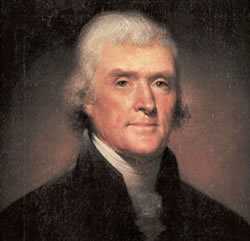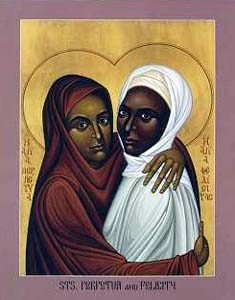Bottled Lightning:
Don't Extinguish the Fire, Don't Shatter the Vessel
For Sunday May 13, 2007
Lectionary Readings (Revised Common Lectionary, Year C)
Acts 16:9–15
Psalm 67
Revelation 21:10, 22 –22:5
John 14:23–29 or 5:1–9
 |
Pat Robertson. |
I'm a Presbyterian, so I cringed when the televangelist Pat Robertson predicted hurricanes last year. When he stretches out the palms of his hands, squinches his eyes tight, and announces a healing for a specific person with a specific malady in a far away city, I'm dubious. When he said that America should assassinate Venezuelan President Hugo Chavez, and that Israeli Prime Minister Ariel Sharon's stroke was God's punishment for Israel's pullout from the Gaza Strip, I was totally flummoxed. Goofy is one thing, malevolent is another.
Robertson's excesses tempt me to settle for what a friend once called "functional deism." I'm not a real deist; but I can live, think, and act just like one. The eighteenth-century deists like Thomas Jefferson believed in a supreme being who created the world, ordered it with the predictable laws of nature and morality, but then abandoned it like an absentee landlord. Deists rejected the faintest whiff of a miracle and judged everything at the bar of reason alone. The deist god is remote, safe and silent. He won't bother you, he won't intervene in human history or answer your prayers, and he sure won't speak to you.
But that's exactly what the apostle Paul claims in this week's reading from Acts—that God spoke to him in a "vision." Luke writes that God spoke to Paul and his companions three times. First, the "Holy Spirit" prevented them from preaching in Asia (Acts 16:6), then the "Spirit of Jesus" prohibited them from entering Bithynia (16:7), and then Paul had a "vision" in which he saw a man standing on the sea shore, imploring, "Come over to Macedonia and help us" (16:9). Paul concluded that God had spoken to them through that vision, so they set sail. A few days later when they landed in Philippi, "the leading city of that district of Macedonia" (16:12), it was the first time that Paul had set foot in Europe.
 |
Thomas Jefferson. |
The word for "vision" (horama) occurs twelve times in the New Testament, once in Matthew 17:9, then eleven times in the book of Acts. In Acts Paul had additional "visions," as did Moses, Ananaias, Cornelius and Peter. Both Peter and Paul also say that God spoke to them in a "trance" (ekstasis, 11:5, 22:17–18). And there is no indication, writes the historian Jaroslav Pelikan of Yale, "here or elsewhere in the book of Acts that there would ever come a point in the history of the church when such visions and special revelations would cease. And in fact they did not cease."
As a practical matter, I believe that Robertson is way out of bounds when he invokes the authority of the Spirit of God. He's just too crazy for me, and if you asked me why I would appeal to sanctified common sense. In principle, though, I admit the theoretical possibility that God could speak to him. Or to me or you. Paul's Macedonian vision raises a tangle of honest and complex questions that do not have a simple answer, one of which is, "How do you experience the fullness of the Spirit but avoid the crazy claims of a Pat Robertson and the colorless deism of a Thomas Jefferson?"
In the second century a prophet named Montanus forced the institutional church to grapple with these questions. As the prevalence of signs, wonders, and miracles gradually waned in the decades after the apostles, people wondered: Was this God's will? Was it a consequence of the church becoming more bureaucratic? Montanus believed that the decline in the Spirit's manifestations resulted from the church's moral laxity in matters like divorce and fasting. The sect named after him, Montanism, was thus characterized by fanatical zeal, rigorous asceticism, and an excessive pre-occupation with supernatural manifestations of the Spirit.
The apostle Paul by Andrei Rublev, c. 1420. |
The most famous Montanist was the great African theologian Tertullian, who lived in Carthage (modern Tunisia). Writing in the early third century, he gives us a snap shot of the movement: "We have among us now a sister who has been granted gifts of revelations, which she experiences in church during the Sunday services through ecstatic vision in the Spirit. . . . And after the people have been dismissed at the end of the service it is her custom to relate to us what she has seen."
Church authorities responded to Montanism in two ways—derision and denial. The historian Eusebius scorned those who "rave in a kind of ecstatic trance." He dismissed their "bastard utterances" as the "demented, absurd and irresponsible sayings" of a "presumptuous spirit." The Montanists, he said, "babble in a jargon" that is "contrary to the custom of the church which had been handed down by tradition from the earliest times." According to that tradition, God speaks clearly, sufficiently, and reliably enough through three means—the canon of Scripture, the creeds of the councils, and the clergy of the church. Hippolytus, a contemporary of Tertullian who was martyred in Rome in 235, went further. He taught that miraculous visions ended with the Revelation of John, and, in effect, that the Spirit worked differently now than in the apostolic days.
 |
Montanist martyrs; The Africans Perpetua and Felicitas. |
Our San Francisco Presbytery has 78 churches, but half of them struggle to survive. The Catholic church faces a drastic shortage of priests. Meanwhile, in barely a hundred years, what is broadly known as charismatic or pentecostal Christianity has burgeoned to include 525 million believers from every denomination and country in the world. Apart from Catholics (and many Catholics are charismatic), pentecostals constitute the largest distinct group of Christians, and they are still growing. Social scientists predict that in fifty years they will number one billion believers.
Grant Wacker, professor of history at Duke University, grew up in a pentecostal family and so he enjoys the critical detachment of a scholar but also the advantages of the insider. In his marvelous book Heaven Below he explores how such a zealous, anti-intellectual, counter cultural and divisive movement has not only survived but flourished. He concludes that pentecostals have done two things extremely well. They nourished rather than discouraged the primitive impulse of a deeply felt experience of God, and then they created institutional means to channel the energy. They held emotional prayer meetings and built hospitals. They begged God for healing and founded colleges. They were both credulous and shrewd. In short, pentecostals found ways to “bottle the lightening,” says Wacker, "without stilling the fire or cracking the vessel.”
Paul put it this way: "Do not put out the Spirit's fire; do not treat prophecies with contempt. Test everything. Hold on to the good. Avoid every kind of evil" (1 Thessalonians 1:19–22).
For further reflection:
Reflect upon the hymn by the Irish pastor and writer George Croly (1854):
Spirit of God, descend upon my heart;
Wean it from earth; through all its pulses move;
Stoop to my weakness, mighty as Thou art,
And make me love Thee as I ought to love.
I ask no dream, no prophet ecstasies,
No sudden rending of the vale of clay,
No angel visitant, no opening skies;
But take the dimness of my soul away.
Hast Thou not bidst us love Thee, God and King?
All, all Thine own, soul, heart, and strength, and mind;
I see Thy cross—there teach my heart to cling:
O let me seek Thee, and O let me find!
Teach me to feel that Thou art always nigh;
Teach me the struggles of the soul to bear,
To check the rising doubt, the rebel sigh;
Teach me the patience of unanswered prayer.
Teach me to love Thee as Thine angels love,
One holy passion filling all my frame;
The baptism of the heaven-descended Dove,
My heart an altar, and Thy love the flame.





